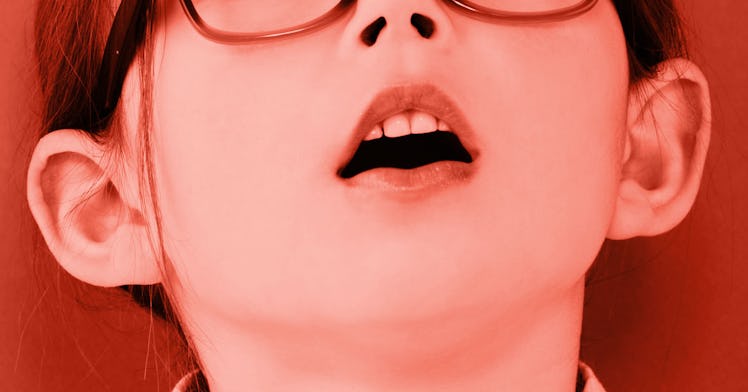Undiagnosed Mouth Breathing Creates Unhealthy Kids
Children who don't breathe through their noses are more likely than their peers to have long-term psychological and health issues.

The notion that mouth breathing is for the unintelligent and inept is a longstanding comic premise, but the medical truth is a bit more unsettling. Mouth breathers, kids who breath disproportionately out of their face hole, are at outsize risk for medical issues. All that panting can actually alter children’s development and the persistent effects of mouth breathing can be difficult to reverse in adults. Though the problem can be hard to diagnose — making it hard to know how many mouth breathers there are — some symptoms can help medical professionals step in when needed.
“Mouth breathing, especially occurring at a young age, changes the development of a person’s face. It makes their face long, chin recessed, nose drop, nostrils flare, teeth crooked, and smile gummy,” physician Dr. Anil Rama explains.” It also leads to cavities, bad breath, bad sleep, and a miserable personality.”
Rama might sound like she’s being harsh. She’s not. There’s ample evidence to suggest that children who are mouth breathers are more likely to struggle in school, cry at night, grow at a slower rate, suffer from moodiness, and develop larger tonsils than kids who breathe out of their nose. When they grow up, mouth breathers are more prone to chronic fatigue, brain fog, and as Rama pointed out, having kind of a weird face. In other words, the way that we use “mouth breather” to connote someone who is a bit off and out of it is actually fairly accurate — albeit distinctly unkind.
Mouth breathing, which is commonly triggered by asthma, allergies, and excessive thumb-sucking, is bad for a fairly specific reason. When people breathe through the nose, it triggers paranasal sinuses that produce nitric oxide, facilitating oxygen circulation throughout the body, helping the lungs absorb oxygen, relaxing muscles, and allowing blood vessels to dilate. Nitric oxide also has anti-fungal, antiviral, anti-parasitic, and antibacterial properties, which strengthen the immune system and stave off infections. Breathing through the nose basically helps clean the body out.
“Nose breathing is important for cleaning, humidifying, and processing the air for the lungs. It’s also directly enhances sleep and regulates breathing which helps one remain calm,” Rama notes. A lack of nose breathing over time can take a tremendous toll on a person’s mood and mental health. “Mouth breathing is what will burden a relationship. Mouth breathers in general are more irritable, angry, lack patience, are stressed out, forgetful, sleepy, fatigued, and not as happy as they could be.”
Doctors can diagnose mouth breathers by looking at behavioral patterns, dental problems, lisping, and hoarseness. But it takes time as all these symptoms are fairly common and not particularly alarming.
People rarely realize the importance of nasal breathing until they get sick with a cold and become congested. When this happens, their sleep, breath, and sanity all suffer. This is typically attributed to the illness but it’s actually a direct result of mouth breathing. Sometimes treating mouth breathing is a matter of treating an underlying illness that impairs nasal breathing, but sometimes mouth breathing can become a matter of habit. For adult mouth breathers, Rama recommends jaw-strengthening exercises to mitigate mouth breathing. But most mouth breathers start when they’re young simply because they don’t realize the consequences, so catching and correcting it early is the most effective solution. Ultimately, mouth breathing is something children should only do when they’re sick. Otherwise they’re sending their bodies a message that something is wrong and changing the course of their development, Rama warns.
“The body is responding and adapting normally to what is an abnormal act of mouth breathing. The result is a deranged and unhealthy body and mind.”
This article was originally published on